- Home
- Belva Plain
Tapestry Page 11
Tapestry Read online
Page 11
She hadn’t seen him in a month, although he had called often on the telephone. They had had a marvelous weekend in New York, hearing Martinelli sing at the Metropolitan one night, and the other night they had heard Eleonora Duse doing Ibsen’s Lady from the Sea in Italian, which neither of them understood. But her voice had been so beautiful! And looking at Duse, one felt inspired to be beautiful, so that one sat up straighter and used one’s hands more delicately. Walking down the aisle during the intermission with Donal’s hand on her elbow, Meg had not been shy about being looked at, had even wanted to be looked at, which was strange, because all her life as far back as she could remember, she had dreaded and hated it.
“Come read your poem,” her father would say to the guests assembled after dinner. “Meg has written the most beautiful poem,” and when she had hesitated, her mother, putting on her strict face, had made her. Yet they had meant well, especially her father had. He was so foolishly proud of her, proud now of her high marks at the college he hadn’t wanted her to go to. They had never understood why she was so afraid of being looked at, and she couldn’t have told them because she didn’t know herself.
But no more. Away from home it was different. With Leah or Paul, and now with Donal, it was different.
Oh, if he were to ask her to marry him, nothing would stop her!
Nothing her parents could say or do. Had they not defied their own parents? They never talked about it, but Aunt Hennie had told her how Emily had been in tears at their wedding, a runaway drab affair at City Hall because her parents refused to come to it. Yes, it had taken courage. Oh, nowadays there were more mixed marriages, even conversions, especially among the fashionable people Cousin Marian knew. The Jewish partner, almost always the man, converted, but it hadn’t been fashionable when Alfie and Emily had married; it had been shocking and rare.
And now they didn’t want Donal Powers because he came from an Irish slum. They had hoped for a stylish marriage, her father forgetting who he was himself. She knew as well as if she had been told in so many words what they wanted for her: a tawny-haired, gray-eyed husband, who was properly connected, who would provide for her a membership in the clubs that had turned Alfie down.
They would be surprised to know how much she had understood when she was still very young.
“There are rumors that the country club wants to buy a piece of our land,” her mother had remarked one day.
And Uncle Dan had answered, “Does that mean Alfie will be able to join?”
He hadn’t fooled Meg with that straight face of his; she had recognized sarcasm. Because, of course, they knew that for all Alfie’s favors and jovial hospitality, they would still never accept him in the club.
How ridiculous it was, and somehow sad, that anyone could care so much about things like that!
Donal had no such stirrings. He was what he was. You had only to look at him to recognize his cool pride. Truly, he was a man. He made you feel strong. You were strong when you were with him.…
She looked at the clock. In half an hour he would be here. The car would come around the curve and stop at the door. Time crawled, as it had been crawling all winter. In the evenings, thinking he might telephone, she had sat with her mind only half on her work; paper rustled, the chair creaked, and the alarm clock moved with a steady click and tick, until she was summoned to the telephone in the hall, or not summoned. New Year’s to midterms, midterms to spring vacation; time crawled as the hands crawled around the clock’s innocent blank white face.
“It’s nice that you don’t smoke,” Donal told her. “I don’t like the way young women have been taking up smoking since the war. I like the old ways. Places like this, too. I’m glad you brought me here,”
“You couldn’t get anyplace much older and still be in America,” Meg said.
The inn at which they were having a midday Sunday dinner, in itself a tradition, was an eighteenth-century farmhouse. An ancient musket was slung below the mantel, which was decorated with bayberry candles in pewter candlesticks. Their table faced this hearth, and the fire warmed their feet. The menu offered hearty food, chowder, roast beef, brown bread, and Boston beans. No mistaking that they were in the heart of New England!
Meg, thinking of Donal as an urban person, had been afraid that he might look askance at all the pine-and-maple rusticity, but it was he who had suggested that they spend the day in the country rather than in Boston. So she had guided him down rural roads through Lexington and Concord and then brought him here, where the food was known to be very good; he had said he was hungry.
“Yes, I like it,” he repeated. “They’re a nice class of people here too.”
The others in the room were couples and families with well-behaved children; all were dressed in good country tweeds. Until this moment, Meg hadn’t thought to notice that Donal also wore a tweed jacket and knickerbockers; it was the first time she had seen him dressed that way, and she thought, Why, he does everything right! He planned this, he watches everything; a city suit would have been out of place in this setting.
“You know, I didn’t think you’d like this kind of place,” she said.
“You don’t know very much about me, Meg,” he answered.
His eyes examined her steadily. She was the first to look away; she had a sense of something imminent.
“I guess I don’t.”
“Well, then, it’s time I told you more about myself.”
He paused. Directly in their view at the next table, an elderly man—very correct with pince-nez and gray moustache—drew a silver flask from his pocket. Quickly he slid it under the tablecloth, while with the other hand he slid a glass of soda water under the cloth. Then, having effected the mixture, he replaced the glass on the table and the flask in his pocket.
Donal looked amused. “A criminal act,” he said, shaking his head.
“My father does it too,” Meg told him. “I always think it seems silly, because the fact is, he really doesn’t like whiskey. He hardly ever touched it until Prohibition came in. It’s funny, too, he always stays within the speed limit, he’s so particular about the law.”
“This adds a little spice to life, a little daring,” Donal said.
“You never do it?”
“What? Carry a flask? No, I have all I want at home. I’m not much of a drinker anyway. Like your father.” He paused again, moved a piece of beef around his plate, and said, “Your father doesn’t approve of me. No, you mustn’t be embarrassed. It has nothing to do with you. With us.”
“He’s really a very kind man. Softhearted,” she apologized.
“I saw that, but he still doesn’t like me.” And he waited for her to answer.
“I don’t know,” she faltered.
“But of course you do,” he said gently. “He must have talked about it … do you know what I do?”
“What you do?”
“Yes. For a living. I deal in liquor. I import it. Illegally.”
She did not know how she was supposed to feel. Shocked, probably. But her father had said many times that he suspected as much. Yet it did not register as anything important. She was only conscious of his hand resting on the table as he leaned nearer across the table, talking to her in an intense low tone.
“I’m what’s known as a bootlegger. Does that seem dreadful to you?”
“No,” she said. “Actually not.”
“This law won’t last forever, you know. There’s no way in the world that you’re going to tell people they can’t have a drink, any more than you can tell them they can’t make love. Alcohol is a part of every civilization known to man.”
“I know.”
“Well, then. Isn’t it better to provide people with stuff that won’t poison or blind them like the stuff they call hooch, doctored up and colored with caramel to fool them? So I bring in the pure product, right from the distillery in Canada. I bring it into New Jersey. It’s an import business, that’s all it is.”
Thoughts ran through Meg’s
mind. When Dad knows this for a positive fact …
“Are you upset, Meg? You look upset.”
“No,” she lied.
Her parents would really make a fuss, enough to drive him away, perhaps.
“It’s all hypocrisy. You can be sure that the politicians who put this law through stocked up their own cellars first, with enough to last for years. Your upper classes”—and Donal’s head nodded in the direction of the table opposite “—get all they want at their expensive clubs. I own a couple of those clubs myself. Judges come there, senators come there. I’m confiding in you, Meg. I’m trusting you.”
There was great confusion within her. She was elated and she was frightened, but also she felt responsible; she felt womanly.
“I feel that my hands are morally clean. I never owned a firetrap tenement or a sweatshop.”
“You sound like my uncle Dan when you say that.”
Donal smiled. “He’s an idealist, isn’t he? I don’t know that I’m quite like him.”
“It was wonderful what you did for him.”
“No trouble. I just knew the right people. That’s what it’s all about, Meg. Knowing the right people. I learned that young. I had to.”
“Ben told us you came up the hard way.”
“True. But why am I bothering your head with all this?”
“You aren’t bothering my head. You can tell me.”
“All right. Let’s have dessert and get back in the car. Maybe we can go for a walk someplace, and we’ll talk some more.”
He started the car, drove for a short way, and turned down a dirt road, little more than a lane wide enough for another car to pass from the opposite direction.
And again, Meg felt a sense of imminence, a tension that needed to be broken. “This is a nice car,” she remarked, for lack of anything better to say.
“It’s well made. I always wanted one like it. I love having things,” he said. “Good things. Grown-up toys.”
That, Meg understood well enough, having witnessed all her life her father’s joy in his possessions.
“You should learn how to drive. This would be a good little car for a woman. In the city I have a man to drive me. It saves time.”
The landscape was frozen. Wind roared in the bare elms that lined the road. The sun went in and out as clouds sped across the cold sky. In barnyards, cows in their shaggy winter coats clustered together for warmth.
“Is it too cold to walk?” asked Donal.
“No, I like it. I’m a country person.”
On the dark northern side of the road, under spruce and fir, a thin film of ice lay in the ditches; water gurgled beneath it. There wasn’t a house to be seen in any direction.
“Take my arm,” Donal said. He pulled her hand through his arm, and thrust the joined hands into his pocket. “Shall I begin?”
“Please.”
“All right. I grew up in what’s called Hell’s Kitchen, a few steps off of Eleventh Avenue, on the top floor of a tenement house, a cold-water flat.” He spoke severely, almost as if he were making an accusation.
“My mother had me, then never any more, because a tumor killed her. Maybe if there had been money for a proper doctor, it wouldn’t have happened, I don’t know. So, like you, I’m an only child. That was a rare thing in my neighborhood. I want a big family, a house full of children.
“My father—he was a longshoreman—was killed on the docks when a crate fell on top of him. So I had to go to work, quit school after the eighth grade. I had a second cousin who owned a bar. He was an old man and he had no sons, so I went to work for him. He promised to leave the bar to me when he died and he kept his promise. I had the place until Prohibition came in.”
Donal was looking straight ahead, still with that severe expression. And Meg thought that other men, except Cousin Paul, looked like boys compared with him.
“You meet a lot of people in that business and I made useful contacts, all kinds. I met a young priest over here from Ireland, who took an interest in me. He knew a good deal about music, knew a good deal about almost everything. He took me to a concert. I hadn’t known there were such places. Carnegie Hall was light years away from Eleventh Avenue … but I got hooked. Can you believe it? I even remember the program to this day. Richard Strauss’s Ein Heldenleben, A Hero’s Life. Father Mooney was his name. He’s back in Ireland now, and we still write to each other. He taught me to read. I mean really read. History and English literature. I swear I learned more from him than I ever would have learned if I had gone on through school. I had a lot to learn, too. Grammar and diction and table manners.”
He pulled their joined hands from his pocket and stood still. “I’ve never told all this to anyone else. Pride, I guess.” He laughed. “Or just not anyone’s business. I’m naturally secretive. But enough about me. What are you studying?”
“History and government.”
“Government! You think a professor on some pretty campus or in a town like this can know what it’s really like? Or that books can tell you how corrupt it is?”
“Well, I’ve read Lincoln Steffens’s Shame of the Cities—”
“All right, then, that’s part of it. I’ve read it too. Let me tell you, everyone has his hand out. And I mean everyone. Judges, cops—they’re all alike. Both parties. I give campaign money to Republicans and Democrats, it doesn’t matter. They all come to me when they run short. I pay the cops to protect my trucks so they won’t be hijacked between the boat and the warehouse. I pay the judges … does that frighten you? It shouldn’t. It’s just the way the world is. Always has been.”
She was mesmerized.
“Now I’ll tell you the rest. I’m a softhearted man. I give money away practically without counting it. I make money and I give it away. The Salvation Army knows me, you can ask them. And the Boys’ Clubs, so kids will have a place to go instead of hanging around the streets. And the orphanages and the Red Cross during the war. You can ask them about me. I wasn’t able to serve because I had flat feet. Crazy! Flat feet! I can outwalk anybody. And the flophouses: I keep soup kitchens there on the Bowery where the poor drunks flop. The temperance people, so holier-than-thou, blame drunkenness on drink when they ought to blame it on poverty. Sometimes a drink is the only comfort a man has. I hope you don’t think I’m boasting, Meg. It’s only that I want you to know all about me, good or bad. Come on, let’s walk. It’s too cold to keep standing.”
Trees closed in. They were walking through a second-growth woodlot of sumac, birch, and cedar. A rabbit crossed the path at their feet and stopped to stare at them out of black, unblinking eyes, then scurried away and disappeared into the dry, warm cover of fallen leaves. Above their heads, there was a squawking in the trees.
Donal looked up. “What are those? Ravens?”
“No. Crows.”
“I don’t know anything about country things. You’ll have to teach me.”
She didn’t know what to say. They stood still again.
“We’ll have plenty of time for you to teach me.”
In that first moment, his meaning seemed clear … she had so dearly hoped, and here it was … and yet, had it been too foolish of her to hope? Could he possibly mean what she thought he meant? He was, after all, so different from her … What could he want with her? A woman like Leah, clever and confident, would be better for him.…
“Won’t we?” he asked.
He put his hands on her shoulders, turning her toward him, but her eyes, puzzled, confused, fearful of being misread and thus making her ridiculous before him, looked stubbornly away. Raising her chin, he forced her to look up at him.
“You know I’m crazy about you, Meg. You do know it.”
She could only murmur, “I … didn’t.”
“But I’ve known it. I only waited to tell you until I could be sure you felt the same.”
He took her head between his hands; in a flashing second she saw his face coming down toward hers; his eyes were closing, curling their black la
shes over the delicate, white lids. He kissed her; her lips opened to meet his while her arms, knowing what to do, went up around his neck, pulling him to her as his arms pulled her to him. So they stood, pressed together in the dry thicket, in the wind.
Heat ran through her, spreading from some secret pit; it was marvelous, mounting and mounting so that she wanted it never to end. She was dizzied, as when once or twice she had drunk wine; this had to lead to something further; it was unbearable, standing here minute after minute, melting into each other.
They pulled apart and stared.
“Well, Meg. That’s it, isn’t it? Did you ever think, when you lay in bed dreaming about a man, that it could be so wonderful?”
“No,” she said, and thought at the same time, astonished, he sees through me, has seen through me, and I am not ashamed.
His mouth twitched with amusement. “Oh, you’re a darling! Oh, I’ve had in my mind somebody like you. Vague thoughts—how could they be anything but vague? I’d never met anyone like you. Where would I? Not the women I knew. And still there was something in me that understood about gentle girls, ladies, warm and innocent and good and loving. Maybe it came from reading about them in Father Mooney’s great books, I don’t know.” Donal laughed. “I walked into the room that day we brought your uncle home, and when I saw you standing there, so tall and quiet, with your serene sweet face, I recognized you, Meg. I knew you. And I knew enough to go slowly with you, not to frighten you. I haven’t frightened you, Meg, have I?”
She put her hands up to his face, touching, stroking with light fingers the three parallel lines in the forehead, the faint crinkle at the corners of the beautiful eyes and the hollow of the cheeks.
He caught her fingertips and kissed them. “Let’s get out of here. The place is too deserted. I can’t be alone with you in deserted places until we’re married.”
They walked back to the car. He didn’t ask me, she thought. He told me. Until we’re married. He moves directly to where he wants to go.

 The Golden Cup
The Golden Cup Her Father's House
Her Father's House Whispers
Whispers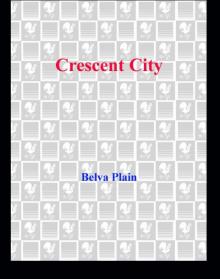 Crescent City
Crescent City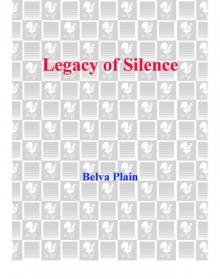 Legacy of Silence
Legacy of Silence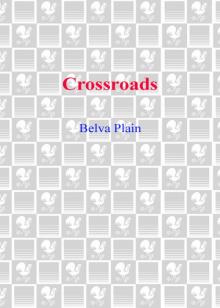 Crossroads
Crossroads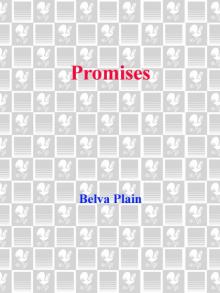 Promises
Promises After the Fire
After the Fire Tapestry
Tapestry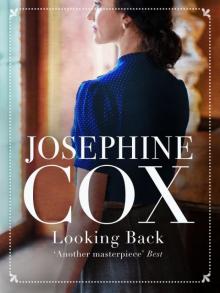 Looking Back
Looking Back Heartwood
Heartwood The Carousel
The Carousel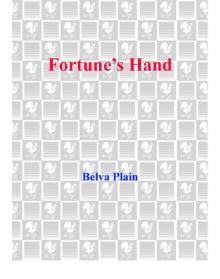 Fortune's Hand
Fortune's Hand Homecoming
Homecoming Random Winds
Random Winds Harvest
Harvest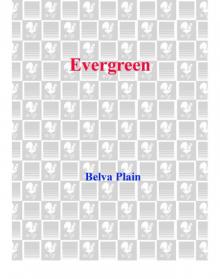 Evergreen
Evergreen Treasures
Treasures The Sight of the Stars
The Sight of the Stars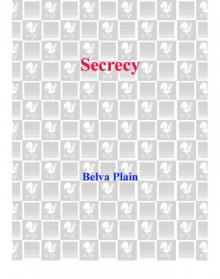 Secrecy
Secrecy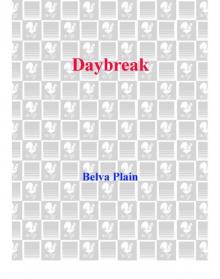 Daybreak
Daybreak Eden Burning
Eden Burning